Tagged stupid human tricks
 One of my biggest fears is having any of my loved ones, especially my children, succumb to misinformation or worse—disinformation. The former is false but not intentionally so. The latter is an outright lie and politically misleading. Both are bad for your health.
One of my biggest fears is having any of my loved ones, especially my children, succumb to misinformation or worse—disinformation. The former is false but not intentionally so. The latter is an outright lie and politically misleading. Both are bad for your health.
But there are several steps each of us can take to avoid, investigate, and ultimate correct misinformation. They are as follows: Continue reading…
 Several years ago, Provo politicians proposed a bond bill to the community to update century-old city schools. The multi-million dollar bond widely passed because the majority of voters agreed with the included line items.
Several years ago, Provo politicians proposed a bond bill to the community to update century-old city schools. The multi-million dollar bond widely passed because the majority of voters agreed with the included line items.
The next year, the other half of the city wanted to update their schools. A second bond was proposed. Only this time, it asked for 40% more money for the same number of schools. Something was fishy. The numbers didn’t add up, despite politicians saying “lumber had gone up.” The community knew it.
Despite manipulative attempts through signs and public speeches that a “vote for yes is a vote for children,” city voters blocked the second bill’s passage. The next year, a revised bond was proposed with much lower costs and tomfoolery. So the community voted in favor of the revised second bond—a vote for both children and honest pricing.
I was proud of my city that day, but only after first telling our local politicians “no.” As in business, if there’s something you don’t like in politics—be it at a local, state, federal, or global level—vote no. And never let melodramatic or manipulate language convince you that “no” means you don’t care about what’s being voted on.
It might actually mean that you care even more and want our politicians to propose even better legislation with the least amount of corruption.

This is an amazing long-read by The Ringer: “It’s a Cinderella story. Mike truly is Cinderella. The money Mike made was stupid money. But it didn’t happen to him overnight. He saw this and we were in it long before all this frenzy. But now he’s set for life.”

Courtesy Boston Globe
This is a great report by Vice on quitting conspiracy theories. From the article:
“These days, Dave lives differently. ‘Mentally, I’m in a much better place. There isn’t a boogeyman around every corner. The mistrust and paranoia is gone. Some of my former compatriots would compare me to Winston Smith at the end of 1984, but that couldn’t be further from the truth. I am able to trust that 2+2=4. Earthquakes happen, people die, stuff happens. There isn’t always a nefarious plot behind it.'”

Wikimedia Commons
PROVO, Ut. — Want to get ahead in this world? Work lots of extra hours — even nights and weekends — experts say, and it will all be worth your while.
“It’s easy to forget what’s most important in life,” says Bill Loney, a certified life coach who hasn’t quite made it in life yet. “Family, friends, and social activities that can often inspire and enrich the life of an individual… these are all distractions in getting more work done,” he adds.
Emma Royds, who hasn’t stopped looking at her smartphone every five minutes for three straight years, councils that most people actually die wishing they had spent more time — not less — working. “People never regret working too much,” she says. “My neighbor opted to do adventurous, social, and fitness-related activities with family and friends in his spare time.
“Now 80, he told me recently he really wishes he would have spent more time on TPS cover sheets, obsessively trying to turn his company into the next big thing, and reading email during every waking hour of his life. It’s kind of sad, really.” Continue reading…
In many ways, modern parenting is a marked improvement over past generations. Many parents today are much more involved, supportive, gentle, and engaged in their children’s daily lives.
On the other hand, my wife and I have observed several not-so-good habits of contemporary parenting. They are as follows: Continue reading…
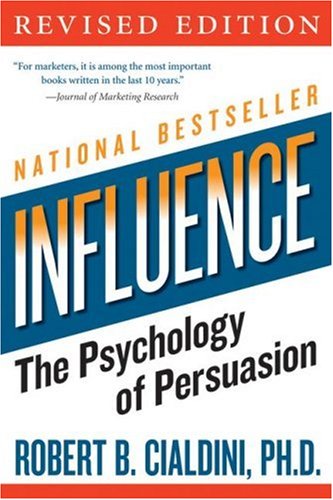 Humans are usually influenced in one of six ways, argues Robert Cialdini in Influence: The Psychology of Persuasion. I suspect there are a lot more subtle and intricate ways to influence, but I think Cialdini certainly covered the highlights in his popular book published in 1984. They are as follows:
Humans are usually influenced in one of six ways, argues Robert Cialdini in Influence: The Psychology of Persuasion. I suspect there are a lot more subtle and intricate ways to influence, but I think Cialdini certainly covered the highlights in his popular book published in 1984. They are as follows:
- Reciprocity. Humans feel obligated to return favors and gifts, even unwelcome ones—which partially explains why their are so many free samples in life. Hence, giving away something for free is an effective way to influence. You can avoid this influence by distinguishing uninvited gifts from welcome ones. For example, “I didn’t want this free food sample to being with, so I won’t feel obligated in giving you anything in return if I take it. Another thing to beware of are unwelcome concessions; say a door-to-door salesman that asks you to donate a large sum to a cause you aren’t interested in, only to lower the donation amount in the hopes you’ll donate something. The takeaway: Don’t donate unless you want to, not because someone is seemingly compromising. Continue reading…
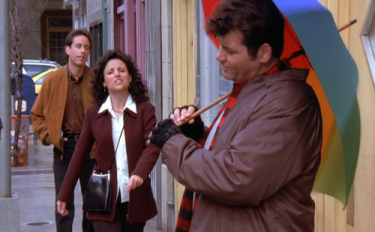
Seinfeld
In a market economy, I believe state run economic development can sometimes be a good thing. But I suspect it’s usually a bad thing. Here’s why, in which a Rhode Island state treasurer cautioned against backing a celebrity owned company that would ultimately become a $75 million bath for taxpayers:
“In general, I would proceed very carefully on this. [The company] is in the Boston area where there are 200 venture capital firms, and it is in a very hot area of gaming so if it were in fact a compelling investment I would have to think it would be well funded already by venture capitalist; the fact that many have looked at it and passed is a red flag.” Continue reading…
 My wife and I went to a screening of Unfortunate Brothers last night. It’s an affecting documentary by Dodge Billingsley about the political, economic, and cultural divide of North and South Korea.
My wife and I went to a screening of Unfortunate Brothers last night. It’s an affecting documentary by Dodge Billingsley about the political, economic, and cultural divide of North and South Korea.
The film is touching, insightful, and kept me engaged for 55 minutes. It also made me sympathize with the plight of North Koreans.
The only problem: The movie was screened to a group of eggheads at BYU, my alma mater, and all the academic and naive student types that congregate there. And not just any kind of academics—the “international relations” kind that like to talk political theory, solve other country’s problems from afar, and use big words to make themselves feel like they’re contributing to society.
For example: After the screening, an expert panel of three pleasant fellows including the filmmaker fielded questions from about 80-100 attendees. The second “question” came from an assumed student that liked to hear himself talk. He talked about how the movie “moved” him. In between lengthy pontifications, he said, “I guess my question is” three times. He talked a lot. He was the opposite of concise. Continue reading…
Hey, you. Yeah, you—the one reading this. The one that says ignorant things like “I’ll sleep when I’m dead,” “I’m busier than you,” or “I only require 3-4 hours of sleep.”
This research by Harvard obviously doesn’t apply to you, because you’re the exception in life. You’re superhuman.
For the rest of us, the study is a convincing reminder of mortality. Not only convincing, but alarming.
Continue reading…

I’m tired of seeing art like this in museums. Last year at my local MOA, someone staged an entire room with nothing but lighting and black pebbles on the floor against an undecorated wall.
My take: Mediocre art like this doesn’t deserve to be in museums. It’s a clunky, cliche, and thoughtless attempt to challenge the definition of art.
We get it. Art can be anything. Pollack and Warhol said so decades ago. Many others before them did the same.
Now stop displaying gimmicky art, museum curators. You’re keeping wall space from more talented and original art.
Snob rant, over and out.
 Since the dawn of the web, humans have become increasingly distracted. Our attention spans are crap now.
Since the dawn of the web, humans have become increasingly distracted. Our attention spans are crap now.
But it’s not because of information overload (which is bunk), argues Clay Shirky. It’s because most people don’t know how to filter useful information from noise. Or worse, they have no self discipline and are incapable of saying “no,” “this isn’t or no longer is helping me,” “when,” or “enough is enough.”
As Shirky calls it, “filter failure.”
So the next time you hear someone blaming “information overload” for their lack of focus, remind them to grow and pair and prioritize their life to the point of quitting useless or excessive behavior.
Next!

As seen in my local newspaper (which I re-upped, btw). Yes, the story, based on a university study, is as dumb as it’s headlined. In sum: Human body wasn’t meant to balance nor support excessive pounds for prolonged periods of time. May fall as a result. Go figure.
 I’ve purchased a lot of product in my life. And if there’s one selling point that gets me more than anything else, it’s something that’s “built from the ground up.”
I’ve purchased a lot of product in my life. And if there’s one selling point that gets me more than anything else, it’s something that’s “built from the ground up.”
Whenever I read this, all my consumer concerns melt away. I hate nothing more than buying something that’s built from the ceiling down — or worse, built upon or added to something that already has a sound foundation.
Now I realize some people may glaze over this cliche. Not me. It’s irreversibly tied to the action of me removing my wallet and reaching for plastic. Hook, line, and sinker.
 If there’s one writing habit I simply adore, it’s seeing a writer use “back in” when referencing previous years or months.
If there’s one writing habit I simply adore, it’s seeing a writer use “back in” when referencing previous years or months.
For example: “Back in 1845…” or “Back in December.” In such instances, the leading “back in” solidifies my otherwise horrible sense of time. Without that “back in,” I’d be completely lost.
Just today, reading a cryptic “In 1997” left me utterly confused. Since I have no concept of past, present, or future tense verb usage, I wasn’t 100% certain the writer was referencing history.
Worse is when a concise writer references a previous month without the oh-so-enlightening “back in.” After all, it’s not like the reader can assume you’re talking about a previous month, especially since you didn’t also reference a year. Case in point: Is “In July” talking about past July or next July? It’s ambiguous. I mean, next we’ll be asking writers to say “next” when referencing the future. It’s unheard of.
So remember writers: Never assume a reader understands chronology. As such, always say “back in” when referring to the past. It’s not wordy or presumptuous at all.

… than whipping your phone out at the alter. “Nothing’s official,” she said, “until it’s Facebook official!”
True story. Incredibly stupid. But true. The bride even had a pocket on her dress to hold her phone.
We now have the attention span of flies.
PROVO, Ut.—The legendary Smooth Harold and his adorable offspring were enjoying a delicious J Dawg last weekend, when they overheard two insecure women bragging about how “busy” their respective husbands were.
“My husband is soooo busy,” said the first obnoxious woman, in a desperate attempt to show how important and needed she was, merely by association. “Oh, I know,” countered the other. “My husband is beyond busy. He wakes at five, skips breakfast, works through lunch, then returns home exhausted. After wolfing down dinner, he studies all night. At this rate, he’ll probably die early. It’s great.”
When asked to confirm the account, an innocent bystander said, “It was the most riveting conversation I’ve ever eavesdropped. Certainly not something you hear often, so it was totally a discussion worth having, not to mention repeating.”
Following the news, competing one-uppers scrambled to rehearse their dull, predictable, and one-dimensional chronologies planned for upcoming family events, weekend gatherings, and chance encounters. “We’re expecting another busy week,” city officials said.
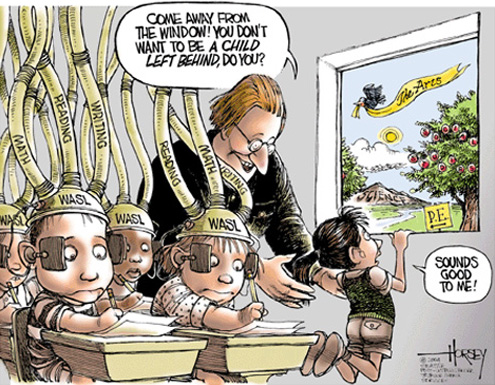 See.
See.
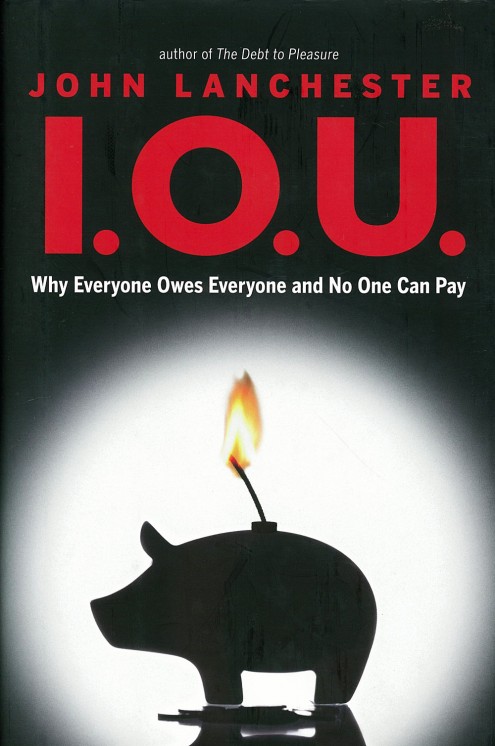
Fascinating book. To the point and practical.
For example, the best way to describe a retail bank is to call it a piggy bank. The best way to describe an investment bank is to call is a casino, which is precisely what each are.
Who knew a book about high finance, banking, and The Great Recession could be such a fun read?
The owner of the second largest company in America walks into city hall.
Continue reading…
[youtube]http://www.youtube.com/watch?v=jE4Fcl7oGQc[/youtube]
Mixing camping with must-see TV?
Honestly, how much could this fan be “enjoying” a game of football on a three inch screen while camping, especially since he probably has 50″ HDTV at home? Grow a pair and pick one: Get away from it all in the great outdoors or stay home to watch a game you’re really interested in. Or if you must, DVR.
Seriously, what kind of sick society are we turning into? The equation is simple.
See also:
[youtube]http://www.youtube.com/watch?v=1pU1LoZeBYk[/youtube]
My brother-in-law works in a Manhattan commercial music studio, producing jingles and licensing original music for use in advertising. Apparently, he deals with this regularly. Favorite line: “That is insulting. We would go out of business if we agreed to terms like that.”
More proof that unrealistic buyers are everywhere. (Although I still think there is value in licensing consumer music in advertising, which this video seems to discredit in an effort to sell more commercial music. What’s more, if demand is this high for “rip off” commercial music, I imagine a supplying studio could really clean up.)
See also: I’m sorry we can’t make a deal. Please don’t heckle me.
[youtube]http://www.youtube.com/watch?v=bjK-0dhdIg0[/youtube]
Because sitting through a two-hour moving on a single sofa is so hard these days. Or waiting for popcorn to pop while a movie is paused is excruciatingly slow.
DirecTV’s response: “We better make it easy for people to pause dramatic movie scenes between kitchen, living room, bathroom, and bedroom TVs. It’s not like they’re going to want to stay engaged in said scenes anyway. Who are we to deny people continuous movies during potty breaks? Now let’s go sell this dumb idea! There’s a sucker born every minute!”
Multi-room viewing is retarded use of technology.
DISCLOSURE: I don’t subscribe to any TV service. (Over-air HD and Internet TV only).
[youtube]http://www.youtube.com/watch?v=JNAC1e2QWc0[/youtube]
That, and it makes excellent use of In the Hall of the Mountain King. Unfortunately, self-discipline is the only way “to save us from our phones,” not another phone. Canceling your data plan helps too. But you gotta mind those texts as well.
 I went to lunch today with an old business school buddy. We always have a good time making fun of brainless ideas while trying to make a honest buck. Today, we ridiculed some of the following business cliches, which are beyond stale and should never be used; otherwise you’ll sound like everyone else and influence few:
I went to lunch today with an old business school buddy. We always have a good time making fun of brainless ideas while trying to make a honest buck. Today, we ridiculed some of the following business cliches, which are beyond stale and should never be used; otherwise you’ll sound like everyone else and influence few:
Continue reading…
1. Perspective
 2. Most powerful colors
2. Most powerful colors
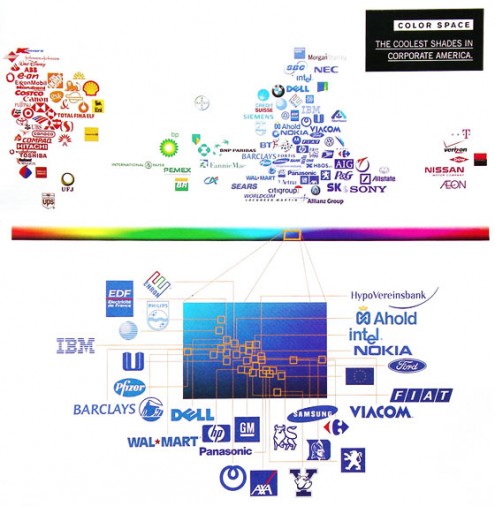 3. Dumb
3. Dumb


Get an overpriced degree from a diploma factory. (Plus two free movie tickets! Now that’s higher education.)
… than watching this. Usually (I make exceptions for high-profile sporting events and the occasional Netflix stream.)
Point is, DVR lowers your standards. You wouldn’t watch half that crap (and by “crap,” I mean poorly produced, written, and acted shows when compared to movies) if it were live. So why subject yourself to lesser entertainment? I’m sure some people use DVR as it was designed: to make it easier to watch the shows you used to watch live. But the majority of DVR users actually abuse the technology, and end up watching more television (i.e. settling) than they normally would.
In that sense, DVR is not better living through technology. It’s clouding our judgment. It’s reducing our ability to think critically.
This just in: Further proof that I’m a teenager trapped in a man’s body.
After a rather disappointing 16 holes of golf last month, I decided to hit a practice shot into a ravine while waiting for 17, which was on the outside edge of the course. As I setup my shot from the side of the tee box, my buddy threw down a verbal challenge: “Try and hit that moving truck on the opposite side of the valley.”
Without thinking, I quickly teed my ball. Since the distance to the other side was so far, I swung half-jokingly, paying no mind to what might happen. Continue reading…
Part two in my Awkward Tip Etiquette series
 I stiffed my take-out waiter for the first time this weekend and got an ugly look for it.
I stiffed my take-out waiter for the first time this weekend and got an ugly look for it.
Normally I tip receptionists a buck for boxing my meal and carrying it all the way from the kitchen to the reception desk. (Excruciating work, I know.) But this time I grew a pair and followed my wife’s example: Don’t tip a restaurant worker for putting carry-out in a bag for you.
Again, I’m fine tipping someone that actually “waits on you” in a dining room. Servers don’t get paid a minimum wage. They’re normally hard workers and/or are struggling to make ends meet. So I’m happy to throw a few Washingtons their way for good service.
But I’m done tipping for carry-out, since the person handing me my food doesn’t add any value to my patronage, nor do they serve. I don’t care if it’s the bartender, the host, or some other receptionist. And I’m not going to let awkward attempts to “serve me” a bag or ugly looks deter me. Unless, of course, you can convince me otherwise.
Do you tip for carry-out food? If so, why?
 This is cute: “Do we still need websites?” asks some guy writing on a website.
This is cute: “Do we still need websites?” asks some guy writing on a website.
Next time write it on Facebook, mister, and see how that works for you.
DISCLOSURE: I regularly design and publish websites.
A friend recently (and politely) declined business from someone he once worked with. This someone didn’t take “no” for an answer. Nor did he take unanswered emails. Behold, his latest email:
Dude… what am I missing here ??
I have always assumed entrepreneurs treated each other with respect and responded to each other; especially those that have known each other for a while.
So… um… why are you treating me (a 3 tie INC 500 winner and 5 x successful entrepreneur; arguably more successful than you)… like crap ?
I respected you enough to personally respond… not to have one of my people call; you.
If that is your definition of class. Please… don’t respond to my email at all.
Persuasion: You’re doing it wrong. Ellipses too. Not to mention unnecessary spacing before question marks. In any case, my buddy did not reply. ZING!

Don’t let the door hit you on the way out (for a second time).
 After Tiger Woods took “extramarital affairs” to new lows this year, numerous sponsors canceled their contracts with the once role model, including Gatorade, AT&T, General Motors, Accenture, Tag Heuer, and Gillette. Out of all his major sponsors, only two “stood by” his sleaziness, including Nike and Electronic Arts.
After Tiger Woods took “extramarital affairs” to new lows this year, numerous sponsors canceled their contracts with the once role model, including Gatorade, AT&T, General Motors, Accenture, Tag Heuer, and Gillette. Out of all his major sponsors, only two “stood by” his sleaziness, including Nike and Electronic Arts.
Today, the latter is wishing it hadn’t. Continue reading…

I have no idea.
By the looks of the cover, it seems this magazine is peddling comics, and not playable computer graphics, more commonly known as video games.
In other words, “concept art” is lame, and does absolutely nothing for me. Is it any wonder this medium is struggling?
My wife has deservedly received traffic citations in the past, most recently last month for going 55 miles per hour in a 40. She also had a run in with a parked dump truck in March, so she’s in no way an innocent driver—particularly this year.
But yesterday, some cop short on quota caught her going 30 in a 25, just five miles over. He tailed her until her destination, a neighborhood birthday party, then flashed his lights as she pulled to a stop. He then barked at her for opening the driver door instead of rolling down her window, which she couldn’t do because the windows were tinted that morning. (Sob story, I know. But it’s true. The windows were all marked with “Do NOT roll down for 3-5 days,” which the cop clearly saw.)
There she was, a mother with three kids in the car—newborn screaming for her bottle—and this overzealous, insensitive, and unfriendly officer ticketed her. And he took his sweet time doing so, all while the baby was crying as if she was going to die (you know how they do it).
Make no mistake, I’m grateful for law enforcement. And I’m obviously biased here. But the stated facts weren’t embellished. This is just another case of some cop not having anything better to do.
As a self-employed individual, I’ve closed a lot of deals. Seven years worth, in fact. Enough to make me a thousandaire. But I’ve lost a lot more than I’ve won, something that’s expected in business.
What isn’t expected, however, are the rare occasions when a prospective buyer ridicules me for not meeting his terms. It usually happens like this: Buyer probes, likes what he sees, and then starts asking questions. We talk. I name my final price. He doesn’t like my final price.
But instead of walking away, like most sane buyers do, this buyer hangs around, and suddenly decides he no longer likes the free market. Continue reading…
In case you didn’t know, I don’t like Wall Street. It’s not that I think the stock exchange is wrong, but I don’t like how its description went from being “speculation” to “investment” in the last 50 years. And I don’t like how it’s primarily sold to the uninformed public.
If you watch TV, chances are you’ve seen numerous investment commercials for Prudential, ING, Pacific Life, Merill Lynch, Charles Swab and countless others. What you might not have seen is the fine print during all this commercials: “Investment products may lose value” and “Investments involve risk.”
This of course is neatly tucked away at the bottom of the screen while some voice over promises an increase in wealth, a secure future, and guaranteed retirement. It’s yet another reminder that what these people are really selling is speculation.
In other words, know your stuff before playing the game, or stick to what you know if you want to protect and grow your principle.
 Courtesy of Joey Reiman for Pink Magazine, published in 2005:
Courtesy of Joey Reiman for Pink Magazine, published in 2005:
- Thou shalt not take the BlackBerry to any table with food on it or family around it. A BlackBerry is not a fruit, nor does it come from a tree.
- Thou shalt not use the BlackBerry as reading material in the event of insomnia. It will only worsen your situation.
- Thou shalt not BlackBerry in lieu of responding to a child’s request (e.g., “Wait a second, I’m reading something.”).
- Thou shalt not place the BlackBerry within distance of hearing its incessant beeps while at home. It is not a bird.
- Thou shalt not check BlackBerry as if it were your baby. It will not cry or stop breathing.
- Thou shalt not confuse number of e-mails with self-worth.
- Thou shalt do everything possible to misplace your BlackBerry on weekends.
- Thou shalt remember that a BlackBerry is not a body appendage. It is a device that belongs in your briefcase or on your desk, and not in social settings.
- Thou shalt refrain from bringing the BlackBerry to events involving family interaction. Extraneous dialogue with this contraption in lieu of real conversation suggests addiction.
- Thou shalt never, ever, ever bring the BlackBerry to bed.
Since canceling my data plan last year, I haven’t broken any of these. (Thanks, Josh)
I like running.
With exception to an injury hiatus, I ran several times a week over the past two years. And since reading Born To Run, I do so enthusiastically (not begrudgingly like I once did).
I normally run continuously for 45 minutes to an hour. On occasion, two hours—whatever I feel like really. I don’t time myself or track miles—an act that makes running feel like work—I just run.
Two weeks ago, I was feeling especially light on my feet. When I left the house on an empty stomach that Saturday, I didn’t plan on running for three plus hours, but I did. I also didn’t take water or food with me, and nearly put myself in the hospital as a result.
Continue reading…
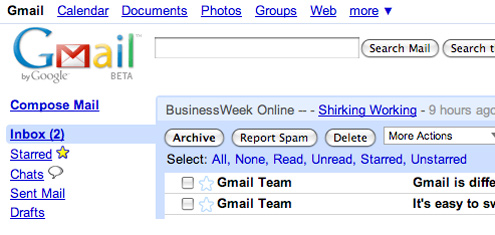
OREM, Utah — After four convenient but usually bad-habit forming years, I canceled my Blackberry email/data plan with T-Mobile last week. To my surprise, I was amazed that my email would actually wait for me on the computer, as opposed to following me around wherever I went. Now, if I’m away from my desk, my email will tell me how many unread messages I have upon my return, so as not to overlook anything. (Some fancy email programs even support audible alerts, such as “You’ve got mail!” Really neat stuff.)
In a flurry of discovery, and in search of more answers, I asked a representative of ARPANET, the inventor of email, for comment. “The great thing about email is that it’s free, provided you don’t give money to your cell phone provider for the same service,” the spokesman said. “And unlike the Post Office, you don’t have to put a hold on your mail if you’re away, say on nights and weekends. If it fits, it ships—which is all the time.”
Continue reading…

Courtesy Shutterstock
I have found, as many before me, that with age comes added responsibility and a much larger to-do list. I’m arguably busier than I’ve ever been in my life with managing a marriage, a new baby, a company, and working on several other projects. Opportunity surrounds us, and I want to take it all in. I hope to learn, experience, and do as much as I can (or even can’t sometimes) throughout my life. I thoroughly enjoy meeting new people, learning new things, and finding other ways of applying the little that I know.
While pondering all of this on my way to Salt Lake City this morning and after catching myself saying “I’m so busy,” to those around me, I couldn’t help but think how this claim might sound to the receiver. Does that phrase add any value to the person listening? Does that make them feel important? If it doesn’t, then do away with it. Continue reading…

From the latest issue of Wired:
Let’s be clear: Walking around with a Bluetooth device in your ear is pure douchebaggery. There is no excuse for it… If you’re out among normals, flaunting your tech doesn’t make you look like the King of Coolsville, it makes you look like Count Clueless of Dorkylvania.
That’s what I said.

At my request, Lindsey bought me some recreational (aka cheap) golf clubs two years ago for Christmas. It took me a year, but I recently become infatuated with sport. I have “found religion,” you could say.
Anyways, last month I was whacking balls with my three wood at the driving range. After a slight miss-hit, I sent both my ball and club head flying into the distance. The ball went about 150 yards. The head went about 30. At first I wasn’t even mad. I was amazed actually. But then I got frustrated with myself. Continue reading…
The British had it right at one time. During the 19th century, their culture viewed stocks and securities exchange as a less than noble venture, according to the writings of Jane Austen and Charles Dickens—like how you and I look upon multi-level marketing companies today. Appropriately, the stock market was widely known then as “speculation.” A theory. A guess. An unverifiable promise or conclusion.
At some point, investment sharks (don’t call ’em bankers) hijacked the accurate description of “speculation” to mean “investments,” “stock market,” and “Wall Street”—prestigious terms that sound nothing like the conjecture they represent. Smart people made money on changes in the fickle market, giving hope to uninformed individuals, who blindly followed and still lose the majority, if not all their money, every few decades. Some are lucky. Most are not.
Continue reading…
My wife and I have been reading classic literature this year. She finished Jane Eyre last week before starting Great Expectations, and I tackled Out of Africa and Old Man and the Sea before moving to Robinson Crusoe. We both agree: it’s inspiring stuff—and much better than junk food reading.
We also agree that those wordy, overblown, or otherwise melodramatic introductions by semi-popular modern authors are lame. I understand it’s a marketing ploy to sell more re-released books, and you can always skip ’em. But they get in the way of great literature. I have yet to read an author introduction that I enjoyed. Let me get to the book already, or at least call the thing an “author retrospective” and put it in the back of the book.
Dumb.
I was told the following story with an Indian boy and rattlesnake growing up, but the principle is just as poetic. From Wikipedia:
The Scorpion and the Frog is a fable of unknown author, often mis-attributed to Aesop. The story is about a scorpion asking a frog to carry him across a river. The frog is afraid of being stung, but the scorpion reassures him that if it stung the frog, the frog would sink and the scorpion would drown as well. The frog then agrees; nevertheless, in mid-river, the scorpion stings him, dooming the two of them. When asked why, the scorpion explains, “I’m a scorpion; it’s my nature.”
In other words, “You knew what I was when you picked me up.”
They can take away my representation, but that can’t take away my purchasing power.
I’ve said it before, but it’s been frustrating to watch the ballooning growth of our national debt, after eight years of unprecedented ballooning. For a long time, it seemed as if I was powerlessness to what was going on—like I couldn’t fight back.
Not anymore.
Continue reading…

I have been against any type of taxpayer bailout or “stimulus package” since Congress and America’s most liberal-spending president first passed the $700 billion one in October. I even asked my representative not to vote on the bill, which he did anyway.
As the majority of Americans predicted (60% in both a CNN and Gallup poll), the bailout didn’t work, according to today’s report in The Washington Post. Banks aren’t lending the $200 billion they received from taxpayers back to taxpayers. How kind of them. Continue reading…
I think rhetorical questions can be a persuasive and colorful form of language, but only when left unanswered.
I’m not sure how or when it started, but answering your own insincere rhetorical question seems to be increasingly popular these days, especially among public relation and business folk. Here’s how they do it: “Am I happy about [insert any controversial issue here]? No. But… [insert any justification here].” Worse still, rhetorical answer lovers will often string together three negative questions, followed by a mega justification. Dumb.
Good communication is concise and precise, replete with active voice and direct sentences. In other words, I don’t like when people answer their own rhetorical questions.
 One of my biggest fears is having any of my loved ones, especially my children, succumb to misinformation or worse—disinformation. The former is false but not intentionally so. The latter is an outright lie and politically misleading. Both are bad for your health.
One of my biggest fears is having any of my loved ones, especially my children, succumb to misinformation or worse—disinformation. The former is false but not intentionally so. The latter is an outright lie and politically misleading. Both are bad for your health.
 Several years ago, Provo politicians proposed a bond bill to the community to update century-old city schools. The multi-million dollar bond widely passed because the majority of voters agreed with the included line items.
Several years ago, Provo politicians proposed a bond bill to the community to update century-old city schools. The multi-million dollar bond widely passed because the majority of voters agreed with the included line items.



 Humans are usually influenced in one of six ways, argues Robert Cialdini in
Humans are usually influenced in one of six ways, argues Robert Cialdini in 
 My wife and I went to a screening of
My wife and I went to a screening of 
 Since the dawn of the web, humans have become increasingly distracted. Our attention spans are crap now.
Since the dawn of the web, humans have become increasingly distracted. Our attention spans are crap now.
 I’ve purchased a lot of product in my life. And if there’s one selling point that gets me more than anything else, it’s something that’s “built from the ground up.”
I’ve purchased a lot of product in my life. And if there’s one selling point that gets me more than anything else, it’s something that’s “built from the ground up.” If there’s one writing habit I simply adore, it’s seeing a writer use “back in” when referencing previous years or months.
If there’s one writing habit I simply adore, it’s seeing a writer use “back in” when referencing previous years or months.


 I went to lunch today with an old business school buddy. We always have a good time making fun of brainless ideas while trying to make a honest buck. Today, we ridiculed some of the following business cliches, which are beyond stale and should never be used; otherwise you’ll sound like everyone else and influence few:
I went to lunch today with an old business school buddy. We always have a good time making fun of brainless ideas while trying to make a honest buck. Today, we ridiculed some of the following business cliches, which are beyond stale and should never be used; otherwise you’ll sound like everyone else and influence few: 2.
2.  3.
3. 

 I stiffed my take-out waiter for the first time this weekend and got an ugly look for it.
I stiffed my take-out waiter for the first time this weekend and got an ugly look for it. This is cute:
This is cute: 
 After Tiger Woods took “extramarital affairs” to new lows this year, numerous sponsors canceled their contracts with the once role model, including
After Tiger Woods took “extramarital affairs” to new lows this year, numerous sponsors canceled their contracts with the once role model, including 
 Courtesy of
Courtesy of 



